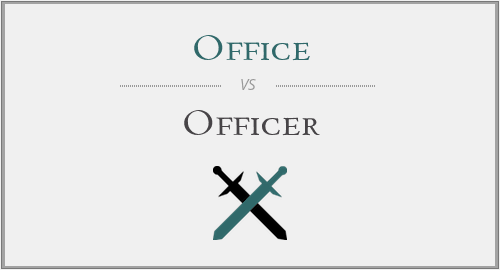Office vs. Officer
Their similar spellings aside, "office" and "officer" have another key aspect in common: they both function as nouns, in any context or phrase. This means that it’s even harder to spot the difference between them, especially given the fact that they come from the same grammatical group hence they are also connected by word category: both acting as a noun in a sentence.
So, you’ve probably noticed that the noun "officer" is the word ‘office’ just with an added "-r" at the end. But in no circumstances is ‘officer’ ever a long version of the word ‘office’! It is essential to clearly understand and distinguish “office” from “officer” in order to correctly use them in your English.
When do we use "office"?
A very common English noun, which you’ll hear used often in any native-English-speaking area, “office” is an everyday word which happens to have a number of meanings. The primary definition of the word “office” is a room or a building where employees do their job at work. A good clue to help you remember this meaning is that you’ll often hear people say they are going to their “office”, which practically means they are going to the building where they work.
Further, "office" may also be understood with two secondary meanings that derive from its main definition. Firstly, it can be used when referring to a room or space where tickets, services or information can be received. Secondly, it can also be used to define a significant position or job within a particular organization. The examples provided below will show you exactly how the word “office” can be used accurately with all of these meanings:
Example 1: Your work as an employee in our office starts at 10 a.m. - "office" mainly defines a room or building where employees work.
Example 2: Your tickets may be collected at the ticket office upon arriving. - "office" may also define a room or building from where people can get services, information or tickets.

Example 3: The committee wishes to award you a medal of honor to recognize your many dedicated years in office. - "office" may also refer to an important position within an organization.
When do we use "officer"?
Unlike “office”, “officer” is quite a bit simpler and easier to remember, given its common nature and use in English and its singular meaning. The word “officer” simply defines a person with an important job in an organization, usually a public one such as the police force, the military or within a governmental department. Because of the meaning of the similar word “office”, you may be tempted to follow logic and think that it refers to a person who works in an office. However, don’t fall into this trap! Have a look at the example below to see how to use “officer” correctly.
Example: I already admitted to everything I know to that police officer in the black uniform. - "officer" defines a job with public authority, within the police force, military organization or in the government department.
Conclusion
If you need a quick trick to keep things clear in regard to the meanings of “office” and “officer”, simply remember that an“officer” is not a person who works in an“office”, rather it is someone whose job has some kind of public authority, whether it’s within the navy, army, police, military or government. Whereas, an “office” is actually the room or building where employees do their job or where people go to ask for services, tickets or information.
So it’s essential to remember that despite the connections and similarities in word order and spelling of “office” and “officer”, the two words are not interchangeable and must not be replaced with one another.




Have a discussion about this article with the community:
Report Comment
We're doing our best to make sure our content is useful, accurate and safe.
If by any chance you spot an inappropriate comment while navigating through our website please use this form to let us know, and we'll take care of it shortly.
Attachment
You need to be logged in to favorite.
Log In